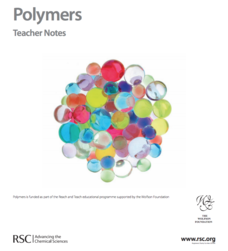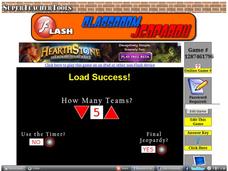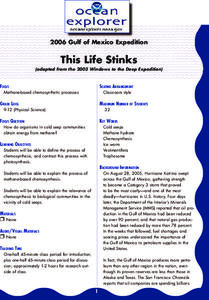University of Georgia
Flavor of Organic Chemistry
Introduce organic chemistry through an analysis of flavor. A three-part unit begins with an overview of the components of flavor. Next, scholars prepare esters through esterification. Finally, they examine how all senses have an impact...
Royal Society of Chemistry
Chemistry Masterclass—Chemistry Outreach
Immerse your chemistry class in the world of organic chemistry! Science scholars isolate acetaminophen from an over-the-counter sample during an intense and interesting lab. Groups use many different separation and analysis techniques to...
Royal Society of Chemistry
Polymers—Gifted and Talented Chemistry
Polymers are an important part of our day-to-day lives, but how much do your pupils know about them? Learn the basics and beyond in a series of activities designed to build skills in observation, planning, organic chemistry, and bonding.
European Schoolnet
Chemistry: All About You
Developed for the 100-year anniversary of Marie Curie's Nobel Prize, a book offers lessons and activities to interest scholars in chemistry. It is divided into modules, so you can pick information from each to create your own lesson...
Royal Society of Chemistry
Organic Molecules Day—Chemistry Outreach
In search of an organic lab that employs real-life techniques and analysis methods? Groups carry out the nitration of methyl benzoate, then attempt to determine the number and location of the nitro groups added to the benzene ring....
It's About Time
Organic Substances
Host an exciting lab in which learners burn fruit rinds to better understand hydrocarbons. A reading passage and analysis questions wrap up the lesson.
Teach Engineering
Nanotechnology in Action: Organic Electronics
Even electronics are going organic. Future engineers learn about organic fibers and their uses in electronics and textiles. Specifically, they study graphene and its properties by creating graphite-based fibers in a laboratory setting...
Kenan Fellows
Using Water Chemistry as an Indicator of Stream Health
Will this water source support life? Small groups test the chemistry of the water drawn from two different sources. They then compare the collected data to acceptable levels to draw conclusions about the health of the source. The...
Curated OER
Periodic Table of Fun
Are you looking to put the fun back in the fundamentals of chemistry? Why not have groups create their own periodic tables of something (animals, food, music groups, etc.) practicing the organizational strategies used in the periodic...
Royal Society of Chemistry
Electrochromic Polymer—Chemistry Outreach
From windows that tint themselves to OLED technology, electrochromic polymers are redefining our ideas about conducting materials! Introduce your chemistry class to the emerging trend with an exciting lab activity. Budding materials...
Earth Day Network
Staying Green While Being Clean
Clean up the environment with a instructional activity that focuses on replacing hazardous cleaning supplies with green, environmentally-friendly products. Using a dirty patch of surface as a control area, kids clean other parts of...
Baylor College
Pre-Assessment: The Brain
Break your class in to the general structure and function of the brain. Brainiacs discuss what they know about it and create personalized brain development timelines. They also take a true-false, pre-assessment quiz to get them thinking...
Super Teacher Tools
Classroom Jeopardy
Why not review for that chemistry test with a little healthy classroom competition? With a fun and interactive Jeopardy-style game, you can adjust the number of teams, keep track of scores, and even make your own test if the provided...
Royal Society of Chemistry
Lead Compounds: Precipitation Reactions and Pigments—Microscale Chemistry
Colorful lead compounds never fail to impress! Solubility scholars examine a series of double replacement reactions involving lead nitrate and record their observations. The second part of the experiment illustrates the differences...
Teach Engineering
Balancing Liquid on a Coin: How Intermolecular Forces Work
Let knowledge of chemistry flow like water. Future scientists conduct two different experiments to investigate the properties of water. They learn about surface tension and cohesion as they see how many drops of water they can place on a...
NOAA
Deep-Sea Ecosystems – Chemosynthesis for the Classroom
Photosynthesis was discovered in the 1770s, but chemosynthesis wasn't discovered until 1977. While many have performed an experiment to show how photosynthesis works, the activity allows pupils to observe chemosynthesis. Scholars set up...
Curated OER
This Life Stinks
Chemosynthetic communities of cold seep areas are considered in this lesson. Working in collaborative groups, marine biology or oceanography learners research and prepare a report about oxidation-reduction reactions involved with...
Consortium for Ocean Science Exploration and Engagement (COSEE)
Carbon Dioxide & Krill: Impacts
What effects do temperature and carbon dioxide levels have on the zooplankton of Antarctica? This concluding lesson plan in a short unit on climate change and the ocean helps environmental scientists answer these questions. After...
Curated OER
The Anxiety Workbook For Teens
Teens often face a great deal of worry in their lives, and can be at a loss with how to anticipate and handle their emotions. This workbook is an exceptional resource for both educators and students alike as a way of supporting...
University of Minnesota
Dendritic Spines Lab
This is your brain on drugs ... literally! Your neuroscientists-in-training examine the evidence of drug use on the human brain and how neurons change their connectivity when altered by drugs. They then work together to create testing...
Aquarium of the Pacific
Lego Molecules
Young scientists construct an understanding of molecular compounds in this hands-on science lesson. Using LEGO® to model the atoms of different elements, students build molecules based on the chemical formulas of common compounds.
Olomana School
Mixtures and Solutions: Paper Chromatography Experiment
Why does some ink bleed through paper, and other ink doesn't? Practice some paper chromatography to separate the colors from a pen with an interactive experiment for middle and high schoolers. Learners use a variety of solutions to track...
Virginia Department of Education
Laboratory Safety and Skills
Avoiding lab safety rules will not give you super powers. The lesson opens with a demonstration of not following safety rules. Then, young chemists practice their lab safety while finding the mass of each item in a mixture and trying to...
Virginia Department of Education
Elements and Electron Configuration
It's electronic! Pupils uncover elements and their electron configurations as they explore mass, groupings, correct charges, and sliding theory. Young scientists learn creative ways to remember various elements and correctly...
Other popular searches
- Organic Chemistry Projects
- Organic Chemistry Activities
- Naming Organic Chemistry
- Organic Chemistry Alcohols
- Organic Chemistry Lab
- Organic Chemistry Model Sets
- Organic Chemistry Quizzes
- Organic Chemistry Detergent
- Simple Organic Chemistry
- Organic Chemistry Reactions
- What Is Organic Chemistry
- Organic Chemistry I























